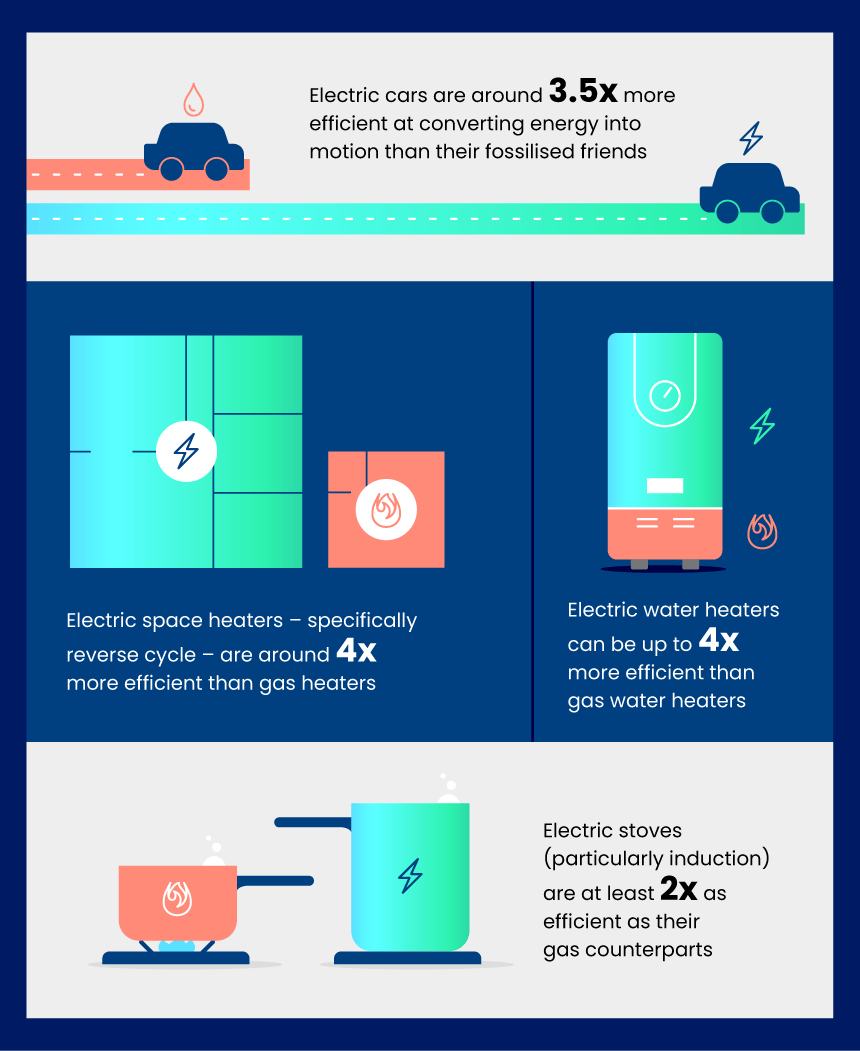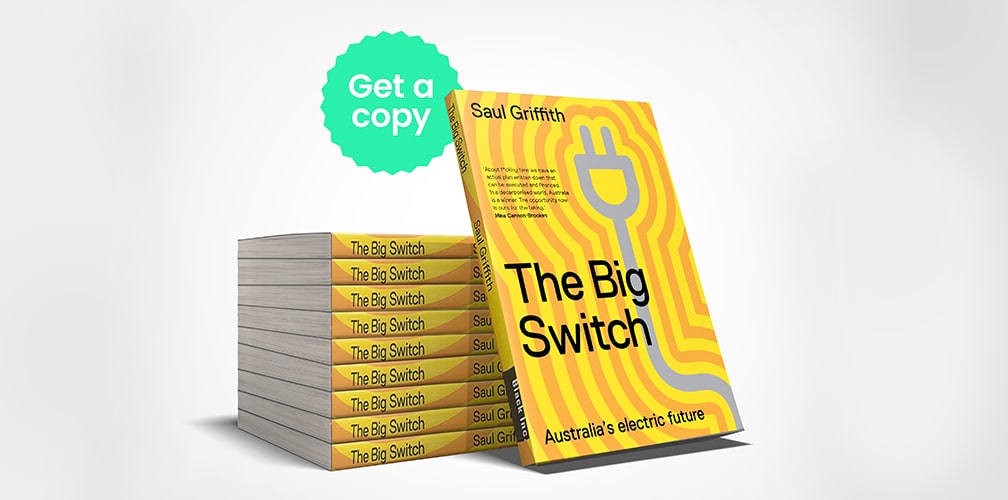Here at Momentum, we like electricity. Obviously. But if there’s one thing we learned from engineer and knower-of-things Saul Griffith’s book, The Big Switch, it’s that we have not been showing our appreciation nearly
enough.
It might sound counter-intuitive, but he believes that electricity will be key in keeping global warming under 1.5°C – that all important number that decides whether our planet continues to sustain life as we know it, or reaches
a tipping point we can’t recover from.
But that’s absolutely enough of the bleak stuff. Truthfully, the future Saul paints is bright – a world where regular households are decked out with every possible comfort, without a single emission. Let us explain.
Houses have emissions
When we think of pollution, we usually picture things like power stations and factories. And if we think of cars, they’re bumper to bumper on a main road in peak hour – not the innocent hatchback at our place. Ready for an
eye-opener? 42% of Australia’s domestic emissions happen at a household level, from things like:
- Vehicles
- Space heaters
- Water heaters
- Gas cooking
If they burn gas or petrol at the time of use, our vehicles and appliances are a source of emissions.
Gas and petrol = wasted energy
When you look at our household emitters, they’re all things that rely on combustion to do their job. Combustion turns the stored energy in petrol and gas into the energy we need – motion for vehicles and heat for the others –
by burning it. But the problem with combustion is that a lot of the energy in the fuel escapes as heat into the air. In other words, the energy is wasted.
Another place waste happens is at fossil-fuel power stations. When we burn coal, up to two thirds of the energy stored in coal turns into heat and is lost to the surrounding air – only around a third goes into heating water like
we need it to.
Electricity is efficient
Electricity is a different kind of energy to gas and petrol. With electric appliances, the transfer of energy is more direct – we’re able to use more of it for the job we’re trying to do. That’s why:

Image description:
- Electric cars are around 3.5 times more efficient at converting energy into motion than their fossilised friends.
- Electric space heaters – specifically reverse cycle – are around 4 times more efficient than gas heaters.
- Electric water heaters can be up to 4 times more efficient than gas water heaters.
- Electric stoves (particularly induction) are at least twice as efficient as their gas counterparts.
Using electricity = no emissions
Unlike gas appliances or petrol cars, there are no emissions when you actually use an electric appliance – emissions associated with electricity only happen at the point of generation. As we retire more fossil fuel power stations and
more renewable generators come on the scene, those emissions diminish (or disappear completely if you’re using your own rooftop solar).
Cleaner air
Burning fossil fuels creates air pollution, which as well as contributing to global warming, affects our health – depending on how often you’re using your stove or oven, gas can make your indoor air 2 to 5 times more polluted.
When we burn in our cars, it’s a similar story.
We can’t solve the problem of burning fossil fuels to generate electricity right away, but moving to electric appliances means cleaner air where we live and work.
Australia could be a renewable powerhouse
Here’s why renewable energy works in Australia:
- Low population density (we have a lot more space than we do energy users)
- Lots of sun and wind (and rain – hi, Tassie!)
For a bit of context, if one fifth of the land we use for farming (not that we plan to displace any cows) was used for solar, we could make enough energy for the entire world. To meet our own energy needs, we’d need to cover less than
0.3% of our land with renewable generators. Sorry for blowing your mind.
Keep Cups won’t save us
A sobering fact: the fossil fuel machines in existence today will create enough emissions in their lifetime to take us to 1.8°C global warming.
So while shrinking your impact with everyday choices is good (think Keep Cups and renewable friendly power companies), we need to start thinking harder about how we replace our once-in-a-decade, big ticket items – many of which run on
fossil fuels – and start replacing them with emissions-free alternatives.
If we scale up renewables, everyone wins
When you make more of something, you save money. And when the thing you’re making is renewable technology, you could save the planet. According to Saul, “making enough renewable energy, batteries and electric vehicles to address
climate change will more than halve the cost of them.”
Renewable energy = cheaper production
Right now, we send a lot of raw materials (bauxite, iron ore) overseas to be turned into things like steel and aluminium, which makes up a big part of our export revenue. But what if we used our access to cheap, abundant solar and wind energy
to process the metals here ourselves?
In addition to creating jobs, Saul estimates that making aluminium here could earn 3 times what we currently get for bauxite, and as much as 10 times more for steel than we get for iron ore. There are other factors at play (competing exporters,
available infrastructure) but it’s a compelling idea to make 100% cleanly-produced metals domestically.
Renewables are a huge investment opportunity
Saul estimates subsidising home electrification would cost around $12 billion over the next 5 years (this involves helping people get access to cheaper electric appliances and electric cars early). For a little context, Australia spent around
$10 billion subsidising fossil fuels last year alone.
By 2035, he expects the energy bill and car savings for Australian homes (if electrified) to be over $300 billion.
Lower emissions ≠ sacrifice
Cutting emissions doesn’t mean shorter showers or doing the groceries on our pushbikes – if everything is electric, our water heaters and cars no longer burn fossil fuels when we use them. And while electricity we get from the
grid will take some time to go fully renewable, we can still put solar and batteries in our homes. When we do, we’ll be able to use as much as we like, guilt (and emissions) free.

Want your own copy of The Big Switch?
Our Big Switch giveaway is now over, but we’ve teed up a deal with Black Inc to give you a 12% discount on the book. Use the link below to go to their website, and enter promo code BigSwitchMomentum at checkout.
Hold up, doesn’t Momentum sell gas?
Yep, we do. Because while we love the idea of electrification, we know not everyone’s in a position to swap out their gas appliances right away. In the meantime, we think it’s important that they can get their gas from a company
that’s still doing its bit for the renewable energy industry.